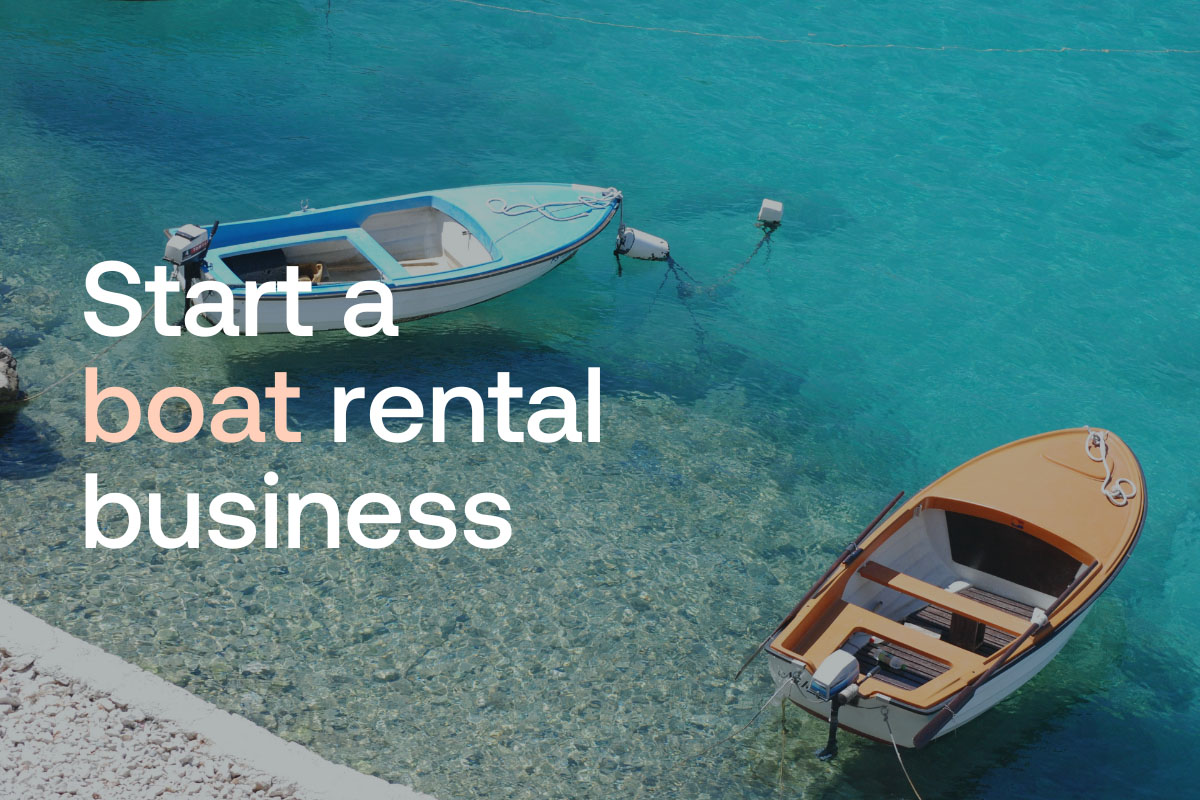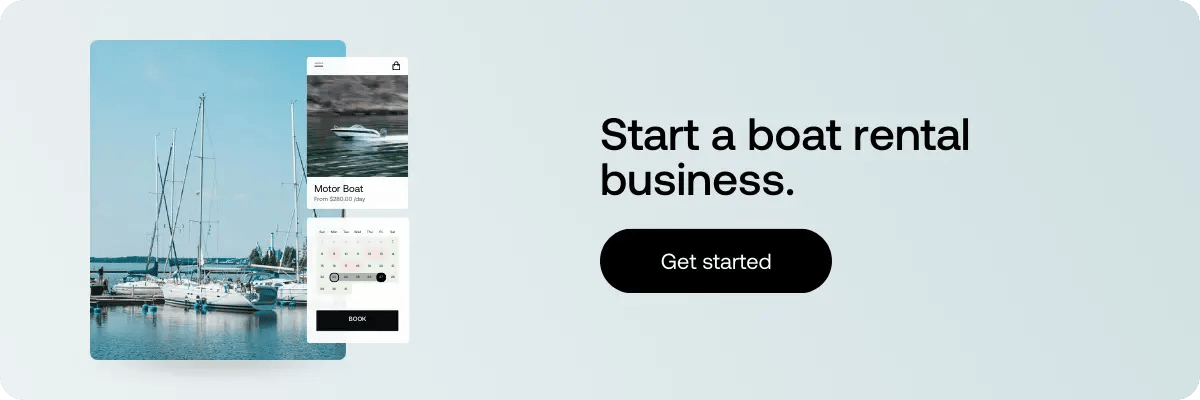Starting a boat rental business could be a fantastic idea if you love being out on the water. It's a great example of a company where you can mix business with pleasure and get a lot of enjoyment from seeing people enjoy themselves.
Customer preferences are shifting from ownership to experiences. Owning and maintaining a boat is a lot of work and requires significant time and money. It has been said that a boat owner's best days are the day you buy your boat and the day you sell it. Starting a boat rental company can help you ride the crest of that wave while using your knowledge and passion for offering customers the best of boating without the pain of ownership.
The global boat rental industry is valued at around $20 bn. With a healthy compound annual growth rate (CAGR) of over 5%, the sector will be worth around $25 bn by 2027. With the right location, detailed business plan, and laser-sharp execution, a boat rental business could translate into a tidy profit.
Figuring out how to start a boat rental business can give you access to a steady and enjoyable income. However, it requires a significant investment of time and money to make it work. Let's explore everything you need to know to realize your boating dreams.
Create a boat rental business plan
Before you can dive into starting your own boat rental business, you must do some research to determine if your plan is viable. Ideally, you'll want to be located near a body of water. While it's possible to deliver the boats, there are a lot of logistics involved, which will eat into your profits.
A business plan is more than just a statement of intent. It's an important document you'll need to produce to secure credit. Considering the high startup costs of opening a boat rental business, that's a bridge you'll most likely have to cross.
Forming a business plan is essential to turn your rental business idea into reality. It involves lots of market and competitor research alongside a strong understanding of expenses and projected income. Once you've done this work, you can formulate your go-to-market strategy. Here's how to get started.
Market research and competitor analysis
One of the first things you must consider is what kind of boat rental business you want to run. People need boats for different purposes, so it's essential to think about what sort of market you want to serve.
Your location will somewhat restrict your options. For example, living in a tourist town will present many opportunities to serve holidaymakers. On the other hand, if you're located in an obscure fishing town, your best bet will be to serve a more local clientele with interest in whiling away their afternoons, hoping to feel a tug on the line.
Some business types you can consider are:
-
Renting out motor boats or fishing boats by the day or hour
-
Running a boat charter business with a staffed crew
-
Serving holidaymakers with houseboat rentals
-
Offering sailboats, deck boats, or yachts
Of course, these are just a few of many examples.
There are lots of different boating and water-based pastimes. This variety means a successful boat rental business can take many other forms. It's up to you to decide which market you're passionate about. Alternatively, you can also look to identify a currently underserved demand.
Your first step is to research your location's overall market and the existing boat rental businesses. Look at what is possible. Are you near a lake, a river, or a seafront? These considerations will shape the kind of boat rentals that you can offer.
Then, study the other boat rental companies in the area. See what they offer. Go online and read their customer reviews, speak to their customers, or check out their business for yourself. Look for gaps in the market so that you can get an edge. You can find a competitive advantage through a strong pricing strategy, compelling experiences, or offering inventory that sounds out from your rivals.
If you want to run a successful boat rental company in a crowded market, you must somewhat differentiate your offering. Some things you can compete on are value, service, or price.
Additionally, with the addition of maritime technology, boating has become more accessible to a broad range of people. Your business has a chance if you can find novel experiences that take advantage of your location.
Another thing to consider is your own experiences. Learning on the job is tough, so if you know a specific type of boat inside out, it makes sense to move into that market. Another reason to go with what you know is that you can maintain and repair your boats independently.
Finally, some types of boat rental businesses are seasonal. That will depend on your local climate and the flow of tourism. Working six months or less per year could be a dream scenario for many people. However, it does mean you're under pressure to bring in money during your busy period.
Budgeting and financial planning
There is no getting away from it. Starting a boat rental business requires a significant investment. You'll obviously need to buy the boats, which will be your biggest outgoing. There are financing options available, which will be especially necessary if you want a fleet of houseboats, deck boats, yachts, and so on.
The average cost of a bay boat is around $30,000. A new houseboat is nearer $150,000. Per this boat market index, yachts cost an average of $1m. Of course, most people won't have spare millions sitting around to start boat rental business investment programs at this level. The same index suggests that boats under 26 feet are around $50,000, while boats over that limit average at around $120,000. There are plenty of options out there.
While running the entire boat rental company yourself is possible, most people will need some staff. Similarly, if you dream of running a charter boat company, you'll need to find crew members.
Some of the other expenses you'll need to consider are:
-
Lifejackets and boating equipment
-
Radios and communication technology
-
Moorage and boat slip rental
-
Website and inventory management software
-
Insurance and business setup fees
-
Harbor and office space fees
Read this article for a more in-depth look at financial planning.
Establish a legal entity for your business
There are a few steps you need to take to open a new business. Renting boats is no different. Here is a rundown of what you must do to make your rental business legit.
Choose a name for your business
Choosing a name is an exciting part of starting a boat rental business. You want something that is memorable and really captures your offering. Consider using boating-related keywords in your name to help capture traffic from search engines.
Once you come up with a few names, check them against the following:
-
Social media accounts
-
Website names
-
Trademarks
-
State business records
You want something unique to avoid confusion.
Form a business entity
Incorporating the right business structure is an important step that you shouldn't take lightly. The right choice can affect your liability for losses and lawsuits and even how much tax you pay. Some of your options here are:
Sole proprietorship: This is the most common business structure. Primarily, that is because they're simple to set up. However, you are liable for debts and damages — which, in extreme situations, could mean a significant financial blow. Additionally, you'll pay taxes on business and personal income.
General partnership: A general partnership is similar to a sole proprietorship. However, it's the type of business structure many people use when they go into business with another individual. Again, these entities are easy to set up. One thing to consider is that you are liable for your partner's decisions, so choose wisely.
LLC: An LLC, or Limited Liability Company, distinguishes you and the business. As such, your assets are protected in the event of a lawsuit or debts. Additionally, these structures allow for pass-through taxation, meaning you only pay personal income tax for your share of the business.
Overall, an LLC is likely the best option for a boat rental business. Liability protection is essential, especially if you need to protect assets.
Register for taxes
Next up, you'll need to register for state and federal taxes. Depending on your services and location, you must also pay sales taxes. Registering is straightforward through the IRS. But remember:
-
a) if you set up a sole proprietorship, you can use your social security number
-
b) if you set up an LLC, you need to get an Employer Identification Number (EIN) from the IRS
Consult the IRS site for further information. If you're starting a boat rental business outside the US, consult your local authorities for guidance.
Set up a business bank account
A business bank account is another essential. Commingling funds is a terrible business idea. It also invalidates the protections afforded by an LLC. Setting up a business bank account helps you get a business credit card and build credit. These facilities can help you with cash flow, which is vital for new businesses in seasonal markets.
Necessary permits and licenses
Ensure you research your local government rules around permits and licenses. For example, you might need a charter captain or watercraft license. Seek out legal advice to ensure that you are compliant before you start offering boat rental services.
Buy a boat rental insurance
Boat rental insurance coverage is essential. While boating is generally safe, there are accidents from time to time. You can't be financially on the hook for them if it's not your fault.
At a minimum, you'll need general liability insurance to protect against injury, medical bills, and property damage. Seek out the advice of a legal professional to ensure you cover your bases.
Inventory management
Your inventory is the lifeblood of your business. Tracking and managing it is crucial for ensuring you get maximum ROI.
Sourcing boats and equipment
As demonstrated above, boats don't come cheap. Scour the second-hand market to find some bargains. Boating knowledge and experience will really pay off here.
Otherwise, depending on the size of your operation, you can save money by buying equipment in bulk.
Tips for maintaining and organizing inventory
Inventory management software is a great way to track your boats and equipment. In an ideal world, you'll have so many boats you can lose track of a few! However, in most cases, that is unlikely. But you'll still need to set up a procedure for making sure you know where your boats are and have records of what equipment is out and who currently holds them.
Marketing and customer acquisition
Depending on your location, you might be able to turn a profit without significant marketing investment. A spot on a marina with heavy foot traffic can be all your boat rental business needs to connect with potential customers. However, if your local market isn't in a big tourist area, you must get creative. At a minimum, you'll need a good website.
Identifying the target market and most effective marketing channels for them
There are many great ways to get the word out about your boat rental business and attract customers.
-
Search engine optimization (SEO): A strong web presence is essential. Here are some tips for an effective local SEO strategy.
-
PPC Ads: Google, Meta, and Bing ads are a great way to get immediate results from search engine intent.
-
Social media: A social media presence is another proven way to connect with an audience. Twitter, Facebook, and Instagram can help you get the word out.
-
Partnerships: Partnering with local hotels and travel agents can bring a steady source of potential customers. Sure, they'll take a cut, but the extra volume can increase profits.
-
Boat rental marketplaces: Although bookings through listing pages often involve a sizeable sales commission, listing at least part of your fleet can be worthwhile regarding visibility.
Creating a brand and messaging that resonates with your audience
Boating is enjoyed by every section of society, from the super-rich on their yachts and families looking for an unforgettable holiday experience to humble fishers looking to key out on a lake and catch something to eat. There is a distinct romanticism to the past time that you need to capture with your brand.
Finding the right messaging will depend on your target audience and the type of boats you rent. Glossy brochures and champagne experiences won't move the needle for people who just want to get out there and fish. Similarly, your target audience wants an experience, and your messaging needs to underline the point.
Tips for building a loyal customer base
Loyalty comes through offering great experiences. If you run your business with honesty, integrity, and transparency, you will build meaningful connections that translate into referrals and return customs.
Operations and growth strategies
Managing the day-to-day boat rental operations can be a big job. However, running your business can be plain sailing with the proper setup and procedures.
Best practices for managing daily operations and logistics
As mentioned above, a good website and booking system can help you streamline sales, while inventory management software can help keep track of your goods. Otherwise, scheduled safety checks and maintenance are a must. The safety of your customers is your first priority.
Rental Contracts and Policies
Boating is expensive, and risk is involved whether we like it or not. As such, your contracts and policies should be watertight. Look at standard boating industry rental contracts and consult a legal professional to afford maximum protection via liability waivers.
Security deposits, a fundamental feature in any boat rental software, will add an additional layer of security. They protect you from minor damages and work well, for example, to charge for cancellations that violate your cancellation policy.
Strategies for scaling the business and increasing revenue
While a boat rental service could be your primary source of income, there are plenty of ways to augment your income.
Repairs and maintenance: If you know boats, you could make a handy sideline in repairing and maintaining other people's boats.
Experiences: While you can run a charter boat business as your primary offering, it's also something you can offer on the side. Selling experiences is particularly effective in areas with lots of tourism. Anything from scuba diving and fishing trips to dinner events on a boat will appeal to the right audiences.
Cross-selling: Selling or leasing boating equipment or things like fishing rods, lines, and bait could be an excellent way to boost your rental income if you run fishing charters.
Watersports equipment rentals: Depending on your location, you can also consider renting out other watersport equipment. Kayak and canoe rentals, for example, are a good complement to the boat rental business, provided the conditions for paddling are favorable.
Subscription services: There could also be room to offer access to your boat on a subscription basis. Charging a flat monthly fee could provide predictable income and take advantage of this emerging business model.
Conclusion
A boat rental business offers an excellent opportunity to marry your love of all things nautical with a profitable business. Explore your local boat rental market and try to find an underserved niche.
As the market shifts towards experiences and memorable days out, boat rentals will continue to grow. Additionally, boats could form a legitimate part of the emerging product-as-a-service market, as a few great examples already show.
So, what are you waiting for? Start your boat rental business today.










